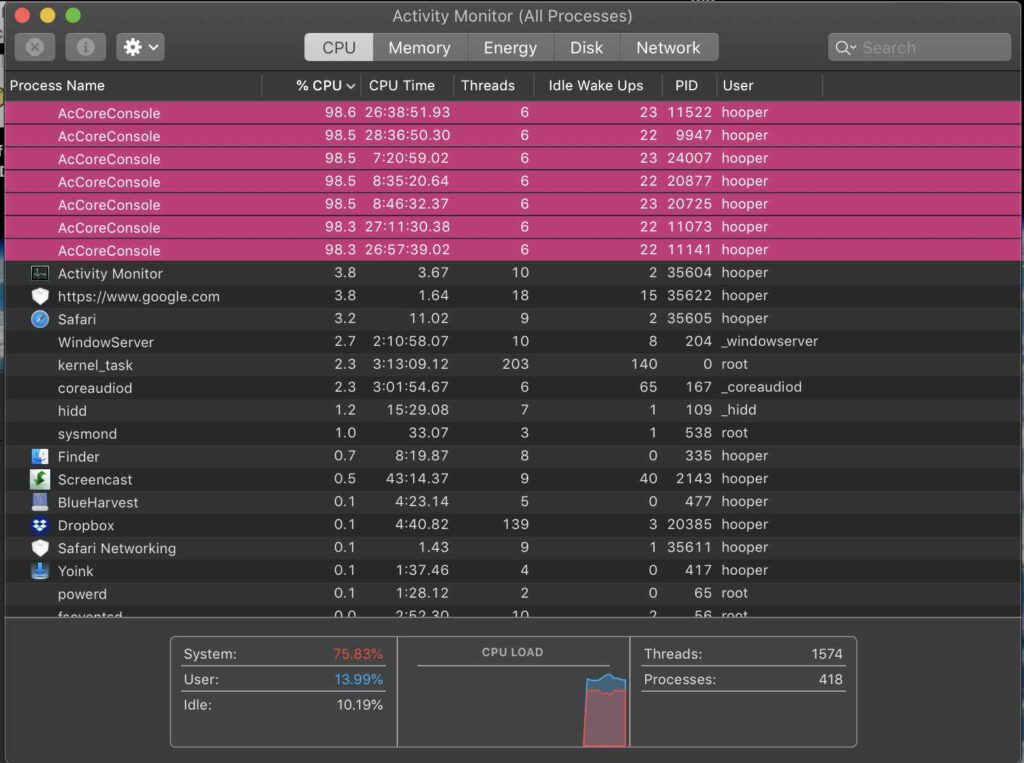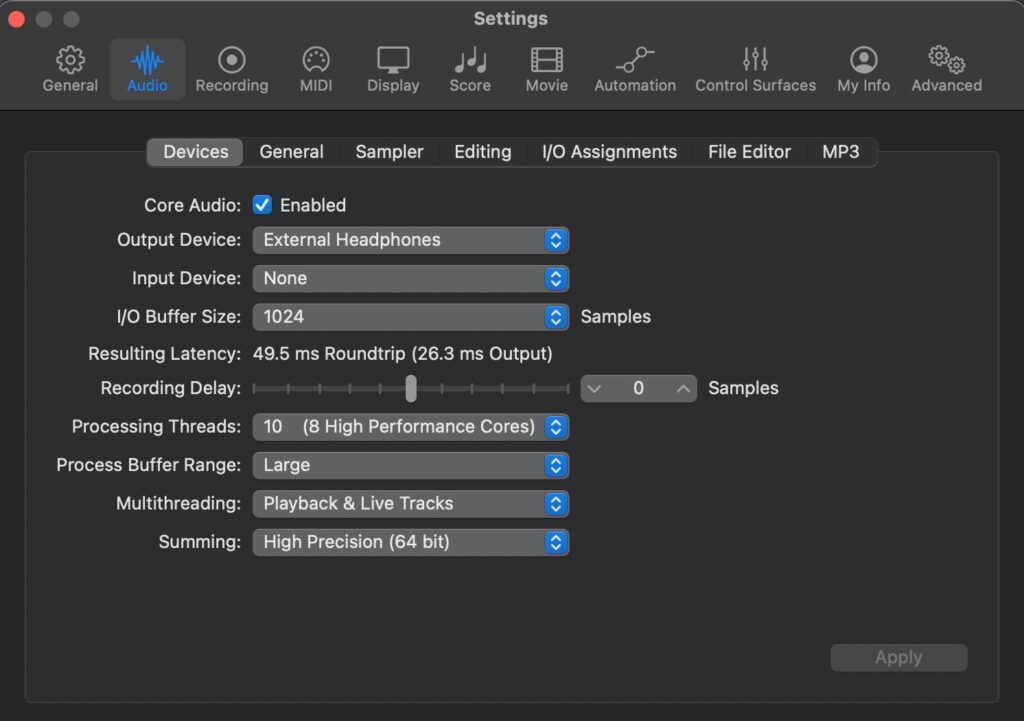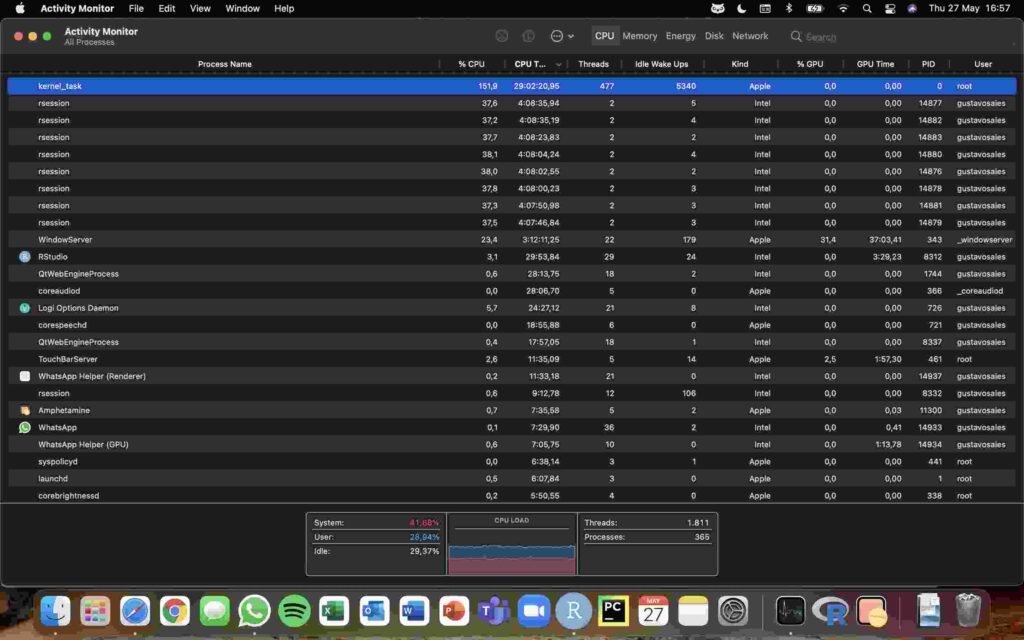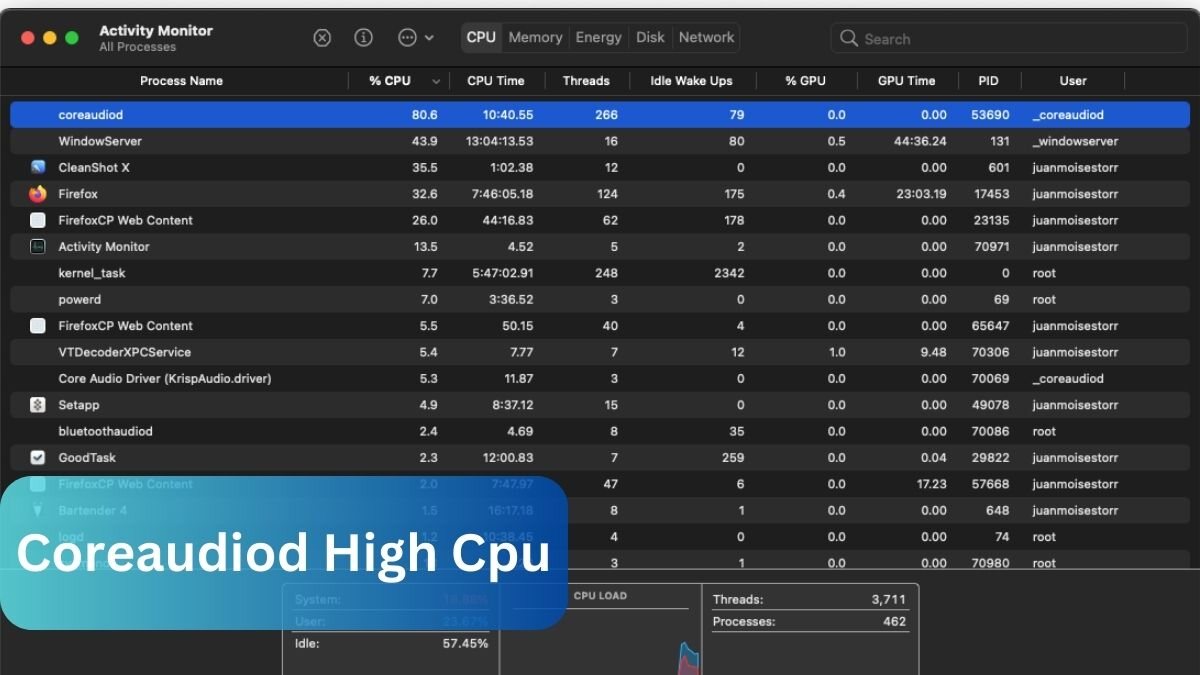I once faced the Coreaudiod High CPU issue on my Mac, where the fans started running loudly, and everything slowed down. It was frustrating because I couldn’t figure out what was causing it, but eventually, I realized it was Coreaudiod using up all the CPU.
Coreaudiod High CPU happens when the Coreaudiod process on your Mac uses too much CPU power, slowing down your system. This can be caused by issues like software bugs, driver conflicts, or misconfigured audio settings. Restarting Coreaudiod or updating your software often fixes the problem.
In this article, we will discuss “Coreaudiod High Cpu”.
Table of Contents
What is Coreaudiod?
Coreaudiod is a system process in macOS that is responsible for managing all audio-related functions on your Mac. It handles everything from playing sounds through your speakers to managing microphone input. Given its central role, Coreaudiod is critical to the overall performance of your Mac’s audio system.
Why Does Coreaudiod Use High CPU?
There are several reasons why Coreaudiod might start using an excessive amount of CPU resources. These can range from simple software bugs to more complex issues like audio driver conflicts.

When Coreaudiod consumes too much CPU, it can cause your system to slow down, apps to become unresponsive, and your Mac’s fans to run at full speed.
Symptoms of Coreaudiod High CPU Usage
You might notice several symptoms if your Mac is experiencing Coreaudiod High CPU usage:
- Sluggish Performance: Your Mac might start to feel slow or unresponsive.
- Increased Fan Noise: The fans inside your Mac may start running loudly as the system tries to cool down the overworked CPU.
- Reduced Battery Life: On MacBooks, excessive CPU usage can drain the battery more quickly.
Read Most Important: Cpu Svid Support: A Comprehensive Guide!
Diagnosing Coreaudiod High CPU Issues
If you suspect that Coreaudiod is causing high CPU usage on your Mac, there are a few steps you can take to diagnose the problem:
- Open Activity Monitor: This built-in macOS tool allows you to see which processes are consuming the most CPU. Look for Coreaudiod in the list.
- Check CPU Usage: If Coreaudiod is using a significant amount of CPU, it will be near the top of the list.
- Identify the Trigger: Consider what you were doing when the CPU usage spiked. Were you using a particular app, playing audio, or adjusting system settings?
Common Causes of Coreaudiod High CPU Usage
Several factors can lead to Coreaudiod High CPU usage, including:
- Audio Driver Conflicts: Outdated or incompatible audio drivers can cause Coreaudiod to overwork.
- Software Bugs: Sometimes, bugs in macOS or other software can cause Coreaudiod to behave unexpectedly.
- Misconfigured Audio Settings: Incorrect audio settings or preferences can also lead to high CPU usage.
How to Fix Coreaudiod High CPU Usage
If you’re dealing with Coreaudiod High CPU, here are some solutions you can try:

Restarting Coreaudiod
One of the simplest ways to resolve Coreaudiod High CPU usage is to restart the Coreaudiod process. Here’s how:
- Open the Activity Monitor.
- Find Coreaudiod in the list.
- Select it and click the X button to force quit the process.
- Coreaudiod will restart automatically, often resolving the issue.
Updating macOS and Software
Keeping your macOS and all software up to date is crucial for preventing issues like Coreaudiod High CPU.
Read Most Important: Where Does The CPU Store Its Computations – Ultimate Guide!
Resetting PRAM and SMC
Resetting your Mac’s PRAM (Parameter RAM) and SMC (System Management Controller) can sometimes fix Coreaudiod High CPU issues. These resets can help clear out settings that might be causing the problem. Software updates regularly include bug fixes and performance improvements that can resolve high CPU usage issues.
You can also check the manufacturer’s website for any updates or patches.
Checking for Audio Driver Conflicts
If you suspect that an audio driver might be causing the issue, try updating or reinstalling the driver.
Adjusting Audio Settings
Sometimes, simply adjusting your audio settings can resolve Coreaudiod High CPU issues. For example, try changing your output device or disabling any sound enhancements.
Preventing Coreaudiod High CPU in the Future
To avoid encountering Coreaudiod High CPU issues in the future, consider the following tips:
- Regularly Update Software: Always keep your macOS and applications up to date.
- Maintain Clean System Settings: Avoid unnecessary changes to your audio settings and preferences.
- Monitor CPU Usage: Regularly check your CPU usage in Activity Monitor to catch any issues early.
When to Seek Professional Help
If you’ve tried all of the above solutions and are still experiencing Coreaudiod High CPU issues, it may be time to seek professional help. Signs that you might need expert assistance include:

- Persistent high CPU usage despite troubleshooting.
- Unresolved driver conflicts.
- Inability to identify the root cause of the issue.
When choosing a professional service, look for technicians who specialize on macOS and have experience dealing with Coreaudiod-related issues.
Read Most Important: Is 70 Celsius Hot For Cpu – Complete Detailed 2024!
What Is Coreaudiod On A Mac? — Review!
Coreaudiod is a crucial system process on Mac responsible for managing all audio-related functions, like playing system sounds and managing input devices. It’s essential for the smooth operation of audio features. If it malfunctions, it can cause significant issues with audio performance on your Mac.
Coreaudiod Extremely High CPU Usage – Overview!
Coreaudiod can sometimes cause extremely high CPU usage, leading to system slowdowns. This usually happens due to software bugs, outdated drivers, or audio configuration issues. Fixing it often involves restarting the process, updating macOS, or checking for driver conflicts.
Core audio, high CPU usage when no sound is playing!
High CPU usage by Coreaudiod, even when no sound is playing, can be a sign of background processes or bugs. This could be caused by apps running hidden audio processes or system errors. Restarting Coreaudiod or checking for software updates may help resolve the issue.
Coreaudiod And Launched Are Taking Up 80% And 40% – Click View!
When Coreaudiod and Launched together consume a large portion of CPU, it indicates system resource strain, often due to background tasks or software conflicts. Checking these processes in Activity Monitor and restarting them can help restore normal performance.
Turn off core audio to save CPU – More Explore!

Turning off Core Audio can save CPU resources, but it disables all sound functions on your Mac. This is a temporary fix for high CPU usage issues and not recommended for regular use. It’s better to address the root cause by updating software or managing audio settings.
Read Most Important: How To Calculate CPU Usage – Optimize The Performance Today!
MP 7,1 Coreaudiod has to be forced to Quit Constantly:
On the Mac Pro 7,1, if you constantly need to force quit Coreaudiod, it suggests an underlying issue with the audio process, possibly due to bugs or driver conflicts. Regularly restarting Coreaudiod or performing system updates may stabilize its performance.
Vtdecoderxpcservice High Cpu:

Vtdecoderxpcservice is related to video decoding on your Mac, and high CPU usage might occur when processing large video files or running multiple video apps. To reduce CPU load, close unnecessary video-related applications or restart your Mac.
Corespotlightd High Cpu:
Corespotlightd is a process responsible for indexing files for Spotlight search. High CPU usage can happen when the system is indexing a large number of files. If it persists, restarting the process or adjusting Spotlight settings may help reduce CPU consumption.
Read Most Important: Are CPU And PCIe Power Cables The Same – Complete Guide 2024!
FAQs
What is Coreaudiod, and why is it important?
Coreaudiod is a system process in macOS responsible for managing all audio-related functions. It’s essential for ensuring that your Mac’s audio works correctly.
How can I tell if Coreaudiod is causing high CPU usage?
You can use Activity Monitor to check if Coreaudiod is consuming a large amount of CPU. If it is, it will appear near the top of the list.
What are the most common fixes for Coreaudiod high CPU usage?
Common fixes include restarting the Coreaudiod process, updating macOS, resetting PRAM and SMC, and checking for audio driver conflicts.
Can Coreaudiod high CPU issues be prevented?
Yes, by keeping your macOS updated, maintaining clean system settings, and regularly monitoring CPU usage, you can prevent Coreaudiod high CPU issues.
When should I seek professional help for Coreaudiod problems?
If you’ve tried troubleshooting on your own and the issue persists, or if you’re unable to identify the cause, it’s time to seek professional help.
What is coreaudiod in Mac?
Coreaudiod is a system process on Mac that manages all audio functions, like playing sounds and handling microphone input.
Why is Audiodg using so much CPU?
Audiodg might use a lot of CPU dues to audio enhancements, outdated drivers, or software conflicts that strain system resources.
How do you force quit the Coreaudiod process?
You can force quit Coreaudiod using Activity Monitor on your Mac by selecting it and clicking the “X” button to stop the process.
How to fix high CPU usage on a Mac?
Fix high CPU usage by closing unnecessary apps, updating software, or restarting problematic processes using Activity Monitor.
What is audio hijack on my Mac?
Audio Hijack is a third-party app that lets you capture and record audio from different sources on your Mac.
What is coreautha on a Mac?
Coreautha is a system process on Mac related to authentication services, helping to manage security and permissions.
Conclusion
In conclusion, Coreaudiod High CPU issues can significantly impact your Mac’s performance, but they are often fixable with simple troubleshooting steps like restarting the process or updating your software. Keeping your system updated and monitoring CPU usage can help prevent these issues from occurring in the future.
Read Most Important:
